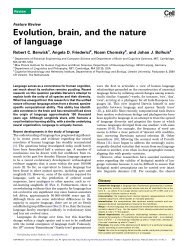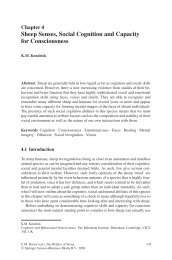Ulric Neisser
Ulric Neisser
Ulric Neisser
You also want an ePaper? Increase the reach of your titles
YUMPU automatically turns print PDFs into web optimized ePapers that Google loves.
would, and indeed continues to do so. To be sure it has not been universally popular: a 1989<br />
paper by Banaji and Crowder even argued that the study of "everyday memory" was "bankrupt."<br />
I was delighted to see their critique. If someone takes the trouble to attack an enterprise in print,<br />
it must be important!<br />
The Emory Cognition Project<br />
Not long after Memory Observed, an exploratory phone call came from Emory University<br />
in Atlanta: would I be interested in a chaired professorship? In a major-league city? The offer<br />
was generous and the timing was good: after sixteen years at Cornell I was ready for something<br />
new. But what would I do there? Thinking that it might be time to try something institutional, I<br />
asked Emory for the support of what I would call the "Emory Cognition Project." The Project<br />
would be housed in its own seminar room, accumulate a modest journal library, and exist chiefly<br />
to sponsor speakers and hold conferences. It was a modest request, but I couldn't think of<br />
anything else to ask for. Everything went smoothly, and Arden and I moved to Atlanta in the fall<br />
of 1983.<br />
In thirteen years at Emory, I developed various new interests and organized various<br />
relevant conferences. Through Cambridge University Press, many of those conferences became<br />
books in a series called "Emory Symposia in Cognition." I was the editor of the first Symposium,<br />
Concepts and Conceptual development (1987). The second (co-edited with Gene Winograd) was<br />
Remembering Reconsidered (1988), an attempt to reconcile the ecological and traditional<br />
approaches to memory. I had little contact with the third, Knowing and Remembering in Young<br />
Children (1990), which was organized and edited by my Emory colleague Robyn Fivush. Before<br />
listing the remaining volumes, I must describe some other developments.<br />
In the early 1980s, an epidemic of apparent child abuse swept across the United States:<br />
several falsely-accused day-care providers even went to prison on the basis of utterly fantastic<br />
testimony given by very young children. This was soon followed by an equally crazy epidemic<br />
of memory: adults in therapy (mostly women) suddenly "recovered" memories of how - as<br />
children - they had been sexually abused by members of their families. Because it was generally<br />
believed that really vivid memories could not be false, the desperate denials of accused family<br />
members carried little weight. Eventually some accused parents in Philadelphia responded by<br />
organizing the False Memory Syndrome Foundation (FMSF), a support group for people who<br />
find themselves falsely accused in this way. Because I was one of the few psychologists who had<br />
actually written about false memories (in Memory Observed), Martin Orne asked me to serve on<br />
the Foundation's Board of Scientific Advisers. I was happy to do so, and indeed am still a<br />
member of that Board. Lacking any clinical expertise my contributions to the enterprise were<br />
necessarily limited, but I did present occasional talks on these issues in the mid-1980s.<br />
Fortunately the false memory epidemic has now subsided, partly as a result of the excellent work<br />
of the FMSF. Today, claims of sudden adult recovery of long-forgotten childhood abuse are<br />
usually met with appropriate skepticism.<br />
Flashbulb memories revisited<br />
Meanwhile, a completely unexpected event rekindled my interest in the old problem of<br />
"flashbulb memories." The event was the disastrous explosion of the space shuttle Challenger on<br />
January 28, 1986. While taking a shower the next morning (at least, that's what I remember!), it<br />
occurred to me that the occasion of hearing about such a disaster might become a "flashbulb<br />
memory" for many people. This was therefore an opportunity to get baseline accounts of such<br />
14




